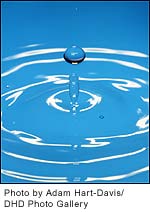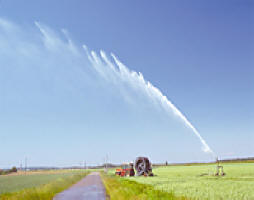 WATER QUALITY AND SUSTAINABLE AQUACULTURE: LINKS AND IMPLICATIONS
WATER QUALITY AND SUSTAINABLE AQUACULTURE: LINKS AND IMPLICATIONS
- In the last years there has been a steady growth in the
development of aquaculture farms due to the increased demand of cultured
species for consumption. One of the by-products of aquaculture is the
creation of specific environmental problems related to intensive production
and unsustainable farm expansion, leading to a boom and burst behaviour of
aquaculture industries.
- Examples are the increasing occurrence of toxic
red tides and the consequent incidence of diarrhetic and paralytic shellfish
poisoning in southern European countries in the early nineties, or the
permanent alteration of natural habitats in Latin America. Therefore,
aquaculture and local water quality (WQ) are closely linked. The large
inputs of nutrients and chemicals and the release of wastes into the
environment may favour toxic algae blooms and induce bottom anoxia and
eutrophication, especially where the carrying capacity of the receiving
domain is limited (e.g., bays and semi-enclosed waterbodies. In turn, low
aquaculture production rates may result from the appearance and spreading of
diseases propitiated by a poor WQ.
| Project number | 15105 | ||
|---|---|---|---|
| Subject(s) | HEALTH - HYGIENE - PATHOGENIC MICROORGANISM , PREVENTION AND NUISANCES POLLUTION , WATER QUALITY | ||
| Acronym | AQUAS | ||
| Geographical coverage | Spain | ||
| Budget (in €) | 150000 | ||
| Programme | INCO MED (FP6) | ||
| Objectives | - This proposal will help to better "structure" the
understanding on the relationship between aquaculture and WQ, aiming towards
the establishment of a set of aquaculture-related predictors for WQ. This is
the soundest way to increase farm production and product quality in a
sustainable manner, i.e., within the frame of a socially acceptable
ICZM. - This goal will be achieved by collecting and combining existing field observations with available numerical simulations,"paving" the way for quantifying the relation between WQ and farm productivity. It will also allow the use of natural forcing mechanisms to increase or get the most out of the carrying capacity of the waterbody. |
||
| Results | The final results will be a starting point towards enhanced aquaculture production without compromising the "health state" of the receiving domain for future generations. | ||
| Period | [01/01/2006 - 30/06/2007] | ||
 you are not logged in
you are not logged in





